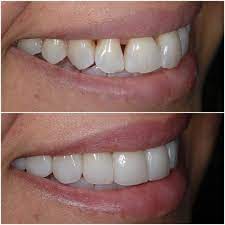Non-prep Veneers - Abu Dhabi - Dubai
Non-prep veneers, also known as minimal-prep or minimal-preparation veneers, are a type of cosmetic dental restoration that requires little to no tooth preparation before placement. Traditional veneers usually involve removing a small amount of tooth enamel to create space for the veneer, but non-prep veneers offer a more conservative approach.
Here are some key points about non-prep veneers:
- 1. Procedure: Non-prep veneers are typically made of very thin porcelain or composite resin material. Unlike traditional veneers, they require minimal alteration to the natural tooth structure. In some cases, no enamel is removed, while in others, a small amount may be lightly etched or roughened to enhance bonding.
- 2. Indications: Non-prep veneers are best suited for patients with healthy teeth who want to improve the appearance of their smiles. They are primarily used to address minor cosmetic issues such as chips, cracks, slight misalignments, gaps between teeth, or discoloration that cannot be effectively treated with teeth whitening.
- 3. Advantages: Non-prep veneers offer several advantages over traditional veneers. Since minimal or no tooth preparation is required, the procedure is generally quicker and less invasive. It can often be completed in just one or two visits. Additionally, the preservation of natural tooth structure is maximized, making the process reversible if desired.
- 4. Limitations: Non-prep veneers have some limitations compared to traditional veneers. They may not be suitable for cases where significant tooth reshaping is required or when there are more substantial cosmetic concerns. Non-prep veneers also have a thinner material, which may be less durable and may not provide the same level of coverage as traditional veneers.
- 5. Longevity and maintenance: The lifespan of non-prep veneers can vary depending on factors such as oral hygiene practices, lifestyle habits, and the specific materials used. With proper care and maintenance, they can last several years. Regular dental check-ups, brushing, flossing, and avoiding excessive forces on the veneers (e.g., biting on hard objects) are important for their longevity.
It's important to consult with a qualified dentist to determine if non-prep veneers are suitable for your specific dental needs. They can assess your oral health, discuss the available options, and recommend the best course of treatment for achieving your desired smile improvements.

